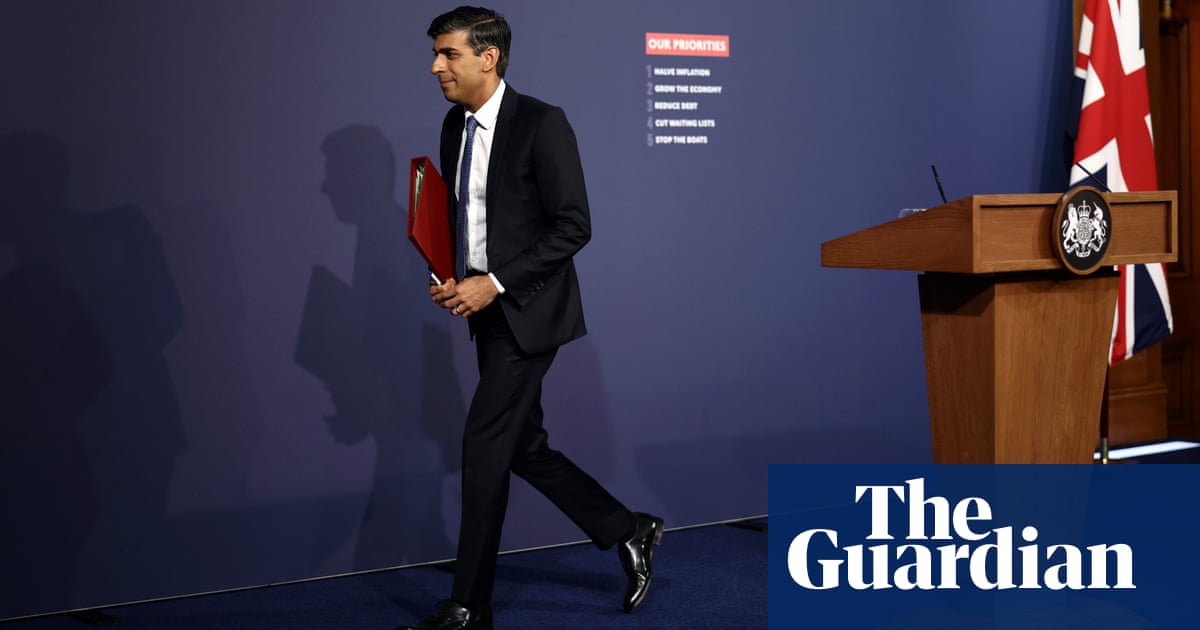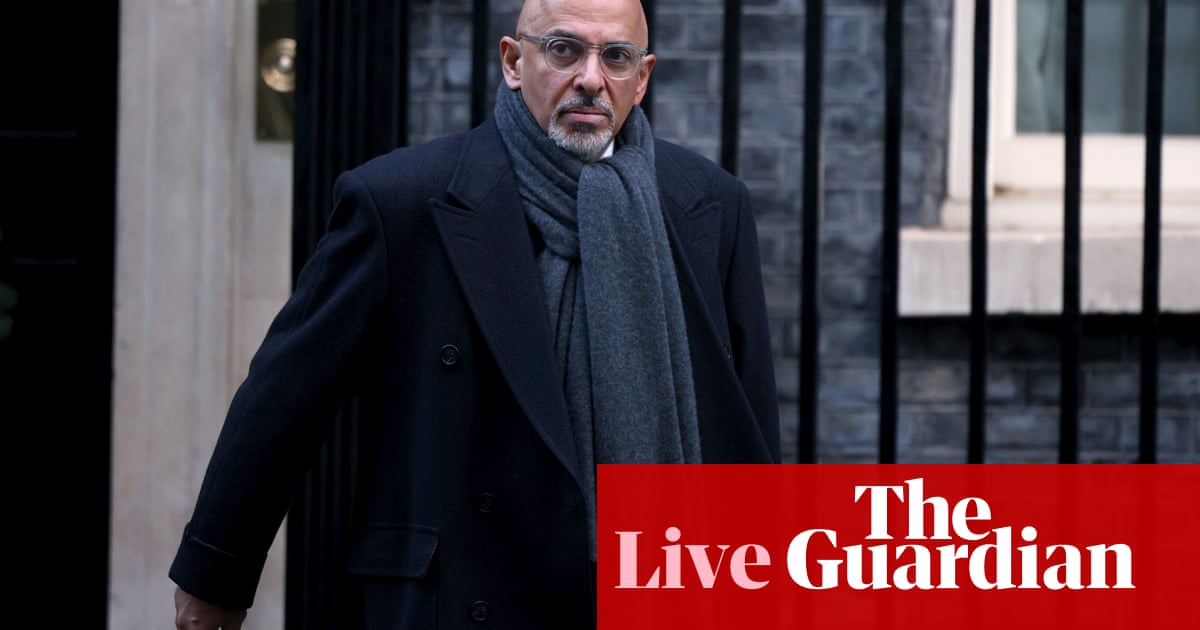
No 10 rejects claims Treasury"s £40bn funding gap analysis means Labour misled voters at election about its tax plans
At the post-PMQs lobby briefing Downing Street rejected suggestions that the latest Treasury briefing about a £40bn funding gap in spending plans (see 9.22am) meant Labour misled voters about its tax plans at the election. During the campaign, Labour set out plans to raise taxes by £7.3bn.
Asked if the public had been misled, the PM’s press secretary said:
No. So we stand by our commitments in the manifesto, which was fully funded.
We were honest with the British public, both during the election and since, about the scale of the challenge that we would receive.
Then, of course, one of the first things the chancellor did when we came in was do an audit of the books and found a £22bn black hole that the previous government lied about and covered up.
So that’s why we have continued to be honest with the British people that there are going to be difficult decisions in this budget, and that’s because of the mess that the Conservatives left the economy in.
Early evening summary
Rachel Reeves aims to make £40bn worth of tax rises and spending cuts in the budget, government sources have indicated.
A bill to legalise assisted dying for terminally ill adults in England and Wales has been formally introduced in the House of Commons, triggering what is expected to be intense discussion over the coming weeks and months on an emotionally charged and controversial issue.
Downing Street has said there was no conflict of interest in Keir Starmer attending a Taylor Swift concert and meeting her, and there would be no referral to the independent ethics adviser over decisions to grant her extra security.
Weight-loss injections are not the “holy grail” of solving the obesity crisis, although they will play an important role in how the NHS treats the disease, the medical director of NHS England has said.
A private donor has paid for a charter flight to repatriate Alex Salmond’s body from North Macedonia, after the Foreign Office rejected calls for the RAF to arrange the flight.
Unpaid carers have welcomed plans to launch a review of “outdated” benefit rules that have left tens of thousands of people who look after loved ones with huge debts and threatened with prosecution, and triggered a scandal.
Today saw the first full opposition day for the Lib Dems in 15 years, as they brought a debate on the carer’s allowance overpayments scandal, which has seen carers required to pay back vast amounts of money due to small, often unnoticed, overpayments, Rosie Anfilogoff reports. She says:
Ed Davey, who is a carer for his disabled son, called the overpayments a “terrible scandal” and raised issues with the current system of carer’s allowance, categorising it as a “daft way of operating”. He, and many others, were particularly concerned with the “cliff-edge” aspect of the payments, which means accidentally earning just 1p over the limit allows the entire allowance to be taken away from carers.
Mel Stride, the former work and pensions secretary, ignored calls for him to apologise, despite overseeing the department during the scandal, which left one in five working unpaid carers affected by overpayments.
Many MPs called for the overpayments to be written off - but Stride called that an “absurdity”.
Today, the government announced a review into the scandal, with Liz Sayce OBE leading the review. MPs welcomed this, but many were disappointed by the review’s lack of breadth, wishing for greater reform to the carer’s allowance system. Davey said the government should “reshape” the review to include wider issues like the “way too low” payments carers receive.
Alison McGovern, the employment minister, sought to reassure MPs, saying the government is “fully aware of all of the issues carers face” and committed to exploring solutions.
Four cabinet minister have entries in the list of updates to the register of MPs’ interests.
Peter Kyle, the science secretary, has declared two tickets, and hospitality, at a Taylor Swift concert, worth a total of £584, paid for by the Football Association.
Ian Murray, the Scottish secretary, has declared lunch and a ticket to a Liverpool v Bournemouth, where he had a meeting with the CEO of Scottish Salmon. It cost £360, and Scottish Salmon paid.
Lucy Powell, the leader of the Commons, has declared three gifts: two tickets for the FA Cup final in May, worth £400, paid for by the FA; two tickets for the British Grand Prix at Silverstone in July, worth £464, paid for by Siverstone; and two tickets with hospitality for a Davis Cup match in Manchester in September, worth £570, paid for by the Lawn Tennis Association.
And Lisa Nandy, the culture secretary, has declared the loan of clothing from the 223 Agency, even though she says the estimated value is below the threshold where donations have to be declared (£300).
Greenpeace expresses concern about review of Defra regulations to ensure they deliver growth
Environmental groups are alarmed at plans to prioritise economic growth in the Department for Environment, Food and Rural Affairs.
Dan Corry, an economist who worked as head of the No 10 policy unit under Gordon Brown, has been drafted in to overhaul the environmental regulators and ensure they are delivering growth.
However, environmental experts argue that regulators should put the health of the natural environment first and that it is a perverse incentive to tell the environment department to prioritise economics.
But Labour has been in favour of a growth duty for some time. Labour MPs voted with the then-Tory government last year to enshrine an economic growth duty in the rules of the regulator Ofwat because they did not want to be accused of being anti-growth.
Greenpeace UK’s director of policy Dr Doug Parr said:
Our natural world supplies incalculable benefits for our health, not to mention the food we eat and vital services such as carbon sequestration and flood management. All of these things bring economic benefits that rarely appear in the spreadsheets of economists in Whitehall and the private sector.
That’s why it’s concerning to see regulations being put in a separate column to ‘economic growth’. Regulations are a last defence for our few remaining wild places, countless species, our seas and waterways, and all of the value they provide to society. Of course Defra is a ‘key economic growth department’ by virtue of its fundamental role as custodian of the riches of the natural world.
If Dan Corry’s role is genuinely to make regulations more efficient, we wish him luck. But the mood music sounds concerningly like the ‘bonfire of red tape’ so often touted by the last government.
In a speech on Monday, Keir Starmer said that he would judge regulations by whether or not they were promoting growth, and that he wanted to “rip out the bureaucracy that blocks investment”.
Kemi Badenoch has declared more than twice the amount of donations to her leadership campaign in October as her opponent Robert Jenrick, the latest MPs’ register of interests has revealed. PA Media says:
Badenoch received more than £130,000 in donations so far this month, including £25,000 from financier Wol Kolade and £20,000 from businessman Charles Keymer, who has now donated a total of £60,000 to her campaign.
Jenrick declared just two donations in today’s update to the register of interests, amounting to £55,000 in total.
These were one £30,000 donation from businessman and former Spectator owner Sir Henry Keswick and a £25,000 donation from Access Industries (UK) Ltd, a company owned by billionaire Sir Len Blavatnik.
Nigel Farage, the Reform UK leader, has declared five income payments in the latest update to the register of members’ interests. They show how much he earns from the media.
Farage is a presenter for GB News and he has declared £60,389, received at the end of September, for about 20 hours work.
He has also declared four other payments: £164 from X, which pays some people who post on the site and generate ad revenue; £786 from Meta, which owns Instagram, another site that pays content creators; £12,248 from Cameo, which allows people to buy personalised messages from celebrities; and £3,044 from Google, which owns YouTube.
The latest edition of the register of MPs’ interests is out. The full register is here, and the updates are here.
I will post some highlights shortly.
Ministers have written to Keir Starmer expressing alarm about the cuts they are being asked to accept in the budget, Ailbhe Rea and Alex Wickham report in a story for Bloomberg. They say:
Multiple members of the premier’s cabinet have sent formal letters to the premier about cuts they’re being asked to make in the one-year departmental spending review to be announced alongside the budget, according to the people, who requested anonymity discussing behind-the-scenes communications. They spoke about the letters on the condition the departments involved weren’t identified.
The unease at the top level of government highlights the political tightrope that chancellor of the exchequer Rachel Reeves is treading as she seeks to restore order to Britain’s public finances through a combination of taxes and spending cuts totaling £40bn ($52bn).
Downing Street told Bloomberg this was a routine part of the budget process.
A donor is paying for a private charter flight to return the body of Alex Salmond to Scotland from North Macedonia, where he died suddenly on Saturday. In a statement, the Scottish government said:
Over the last few days the Scottish government and UK government have been engaging with Alex Salmond‘s family and working closely together in accordance with their wishes, to ensure the swift and dignified repatriation of the former first minister to Scotland.
Having explored a number of options, the family have now made arrangements for this to take place with the support of a private citizen.
The Scottish government continues to engage with Mr Salmond‘s family, and we stand ready to offer further advice and support, should it be required.
According to the BBC, there will be a private funeral for Salmond, followed by a public memorial service later.
According to Sky News, Israel’s national security minister, Itamar Ben-Gvir, has dismissed the news that the UK government has considered imposing sanctions on him over his support for settlers in the West Bank attacking Palestinians. (See 12.21pm.) Ben-Gvir told Israeli media:
Just as before the establishment of the Jewish state the British worked to make it impossible, now they continue to do so after its establishment in the midst of an existential war …
They do not scare me, and I will continue to act in accordance with the supreme national interests of the state of Israel only and for the people of the country.
Unpaid carers welcome Liz Kendall’s plan to review benefit rules
Unpaid carers have welcomed plans to launch a review of “outdated” benefit rules that have left tens of thousands of people who look after loved ones with huge debts and threatened with prosecution, and triggered a scandal, Patrick Butler and Josh Halliday report.
In July Wes Streeting, the health secretary, published the interim report from Dr Penny Dash into the Care Quality Commission. It said CQC ratings could not be trusted, Rosie Anfilogoff reports. She goes on:
The government has now published the full report from the Dash review into the CQC, the independent regulator of health and social care in England which is meant to ensure organisations like hospitals and care homes are safe and effective.
The full report depicts a CQC that functions poorly, leaving patients without the ability to make informed choices on their care, and providers without proper oversight.
In recent years there has been a stark reduction in activity, with the number of inspections and assessments undertaken in 2023 and 2024 almost half what they were in 2018 and 2019.
According to CQC data given to the review, the average age of ratings is 3.9 years old, but there is at least one hospital that was last rated over 10 years ago.
And, the report finds, the CQC has never even rated 19% of locations under its purview. For institutions found to require improvement, the delay for a re-inspection has increased to almost a year when previously it was 152 days, leaving providers stuck in limbo.
The government has welcomed the seven recommendations set out in the report, and Sir Julian Hartley will shortly begin as the CQC’s new chief executive.












